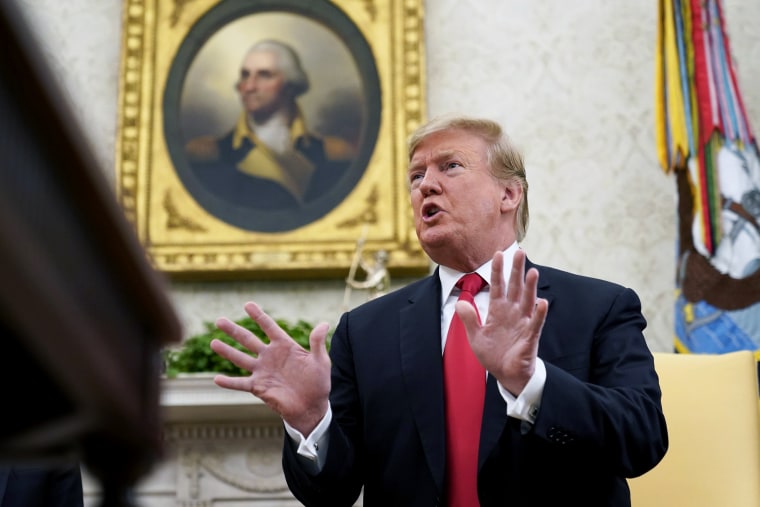Trump, McConnell clash on closing the border
“If we don’t make a deal with Congress, the border’s going to be closed,” Trump told reporters in the Oval Office on Tuesday. “100 percent.”

WASHINGTON — President Donald Trump said Tuesday that he is “100 percent” prepared to shut down the U.S. border with Mexico to block an influx of migrants.
“If we don’t make a deal with Congress, the border’s going to be closed,” he told reporters in the Oval Office. “100 percent.”
At almost the same time, less than two miles down Pennsylvania Avenue, Senate Majority Leader Mitch McConnell, R-Ky., said that might be a financial disaster for Americans.
“Closing down the border would have potentially catastrophic economic impact on our country, and I would hope we would not be doing that sort of thing,” McConnell said, noting that he agrees with the president that there is “a border crisis.”
The disagreement between the top two Republicans in Washington illustrates again the ongoing tension between the president and his own party in Congress as lawmakers try to bat down Trump proposals they believe are ill-advised politically, on policy grounds or both.
McConnell also said Tuesday that he and Trump now see eye to eye on waiting until after the 2020 election to work on health care legislation following Trump’s promise to move earlier. McConnell had balked at that idea. And last week, Trump quickly retreated on two of his own budget proposals — cuts for the Special Olympics and Great Lakes restoration — after hearing criticism from GOP members of Congress.
But it remains to be seen whether he will back off on the border, a signature issue for him that he views as critically important both as a policy matter and in terms of fulfilling a key promise from his 2016 campaign. Increasingly, Trump has shown a willingness to go it alone when Congress rejects his immigration and border-control plans.
On Monday, Homeland Security Secretary Kristjen Nielsen directed Customs and Border Protection to send up to 750 additional officers to the border to assist with a policy designed to keep asylum-seekers in Mexico while they await adjudication of their cases. NBC News first reported on that decision last week. The number could be increased to 2,000, according to the department.
Earlier this year, Trump shut down parts of the federal government for five weeks over a demand that Congress provide $5.7 billion to fund new barriers along the border. After he reopened the agencies, he and Congress agreed to a border package that included money for technology upgrades and about 55 miles of new fencing but prohibited the construction of a solid wall.
Trump then announced he would unilaterally transfer previously appropriated money from the Pentagon’s accounts for building military bases and other areas of the government to build more wall without congressional approval — a move that immediately drew lawsuits from state attorneys general who argue he acted outside his constitutional authority as president.
Trump said Tuesday that he now wants Democrats in Congress to accede to his long-held goals of rewriting the visa lottery system and rules that give favor to family members of people who already have immigrated to the United States.
“Congress has to meet quickly and make a deal,” he said.
Though experts have sounded a similar note to McConnell, warning that shutting the border could hurt the U.S. economy — goods worth more than $1.5 billion cross the border on a daily basis — Trump said that’s a secondary concern for him.
“Security is more important to me than trade,” he said.
Trump also addressed his recent decision to cut off aid to three Central American countries — Guatemala, El Salvador and Honduras — from which many of the migrants have traveled to the U.S. border.
Critics say that decision will likely create more, not fewer, refugees from those countries.
Trump framed it as a natural response to what he views as the failure of the recipients of U.S. aid to give reciprocal value.
“They don’t do anything for us,” he said, and have been “taking advantage of the United States” for many years. “They arrange these caravans, and they don’t put their best people in those caravans … We’re not going to have it anymore.”
Source:
[Disclaimer]